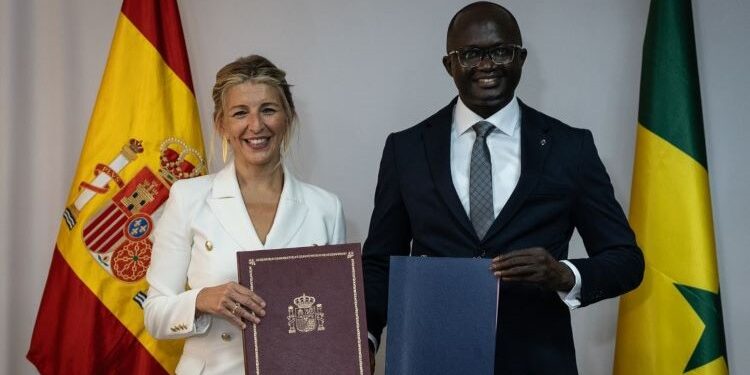Eduardo González
The second vice president and Minister of Labor and Social Economy, Yolanda Díaz, traveled yesterday to Senegal to reinforce bilateral cooperation in the field of Labor Inspection, a week after the Minister of Foreign Affairs, José Manuel Albares, announced the signing in Dakar. of a new Country Partnership Framework (MAP) endowed with at least 180 million euros to promote employment among young people in order to stop irregular emigration.
Díaz held a meeting with the Minister of Labor, Employment and Relations with the Institutions of Senegal, Yankoba Diémé, with whom she signed a declaration of intent to deepen collaboration in matters of Labor Inspection. This is her first official visit to this sub-Saharan country, the only one that has labor counseling in West Africa.
The objective of the agreement, according to the Ministry, is to enhance exchanges between the Labor Inspectorates of the two countries, so that Senegal has the appropriate training and skills to help formalize the economy of a country in which a large part of economic activity takes place in the informal sector.
In Spain it is estimated that around 90,000 Senegalese have settled, while in the African country there are around 5,000 Spaniards. The Chamber of Commerce in Dakar has more than a hundred registered companies, which generate work in this West African country.
Separately, Yolanda Díaz met with the new Prime Minister Osumane Sonko, an opponent of the previous Government who was imprisoned until a few months ago and who took office on April 3, just one day after the arrival to the Presidency of the Republic of his political ally Bassirou Diomaye Faye, winner of the March 24 elections. “Senegal is thus consolidating itself as the great democratic engine of West Africa, in a fragile environment in which other Sahel countries have experienced coups d’état in recent years,” declared the Ministry of Labor.
Visit of Albares
The visit by Yolanda Diaz – who will meet today with the Minister of Microfinance and Social and Solidarity Economy, Alioune Badara Dione – takes place a week after the trip made on June 27 by Albares to Dakar. This was the minister’s third visit to this country, a key and strategic partner for the stability of the entire region, with an important role in the Economic Community of West African States (ECOWAS), in which Spain carries out relevant cooperation projects and where the first Cervantes Institute in Sub-Saharan Africa is located.
During that visit, Albares and Fall reported on the upcoming signing of the new MAP (the document that includes the development cooperation strategy for the period 2024-2028), which will be endowed with at least 180 million euros that will be allocated to training and employment for young people to discourage migration. Half of the Senegalese population is under 19 years of age. In addition, the two ministers also addressed the immigration issue and the search for ways to promote circular migration (hiring at origin and subsequent return to Senegal) in sectors other than agriculture, such as truck drivers, a profession currently in high demand. in Spain.
Albares and Fall also spoke about the possibility of using Spanish cooperation funds to encourage the return of Senegalese emigrants who wish to return to their country and the Senegalese minister assured that her country wishes to “strengthen cooperation even further and do everything possible to cut off this irregular migratory flow towards the Canary Islands at this time and direct people towards legal and regular migration routes, such as the new circular migration routes that we want to explore.” Albares also addressed the immigration issue with the Minister of the Interior and Public Security of Senegal, Jean Baptiste Tine.







